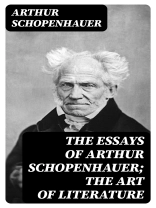Arthur Schopenhauer’s ‘The Essays of Arthur Schopenhauer; The Art of Literature’ delves into the philosophical underpinnings of literature through a collection of insightful essays. Known for his pessimistic views on human nature, Schopenhauer explores the role of art in providing solace and meaning in a world filled with suffering. His writing style is characterized by a blend of rigorous logic and poetic language, making his work both intellectually stimulating and emotionally evocative. This book offers a profound analysis of the power of literature to illuminate the human experience and provide a glimpse into the metaphysical realm. Schopenhauer’s exploration of the nature of beauty, truth, and the will make this collection a thought-provoking read for any lover of literature and philosophy. The essays reflect Schopenhauer’s deep understanding of the human condition and his unique perspective on the purpose of art, making it a valuable addition to the canon of philosophical literature.
Sobre o autor
Arthur Schopenhauer (1788–1860) was a German philosopher best known for his pessimistic philosophical system and as an essential figure in the development of metaphysical and existential thought in the 19th century. Schopenhauer’s philosophy, presented with a distinctive literary flair, was influenced by the transcendental idealism of Immanuel Kant and the Eastern teachings found in the Upanishads. His most significant work, ‘Die Welt als Wille und Vorstellung’ (The World as Will and Representation), lays the foundation for his philosophical inquiries, wherein he posits that the will is the underlying and indestructible reality of the world. In ‘The Essays of Arthur Schopenhauer; The Art of Literature’, he contributes to the field of aesthetics and offers insights into writing and literary criticism. Schopenhauer’s style is renowned for its clarity, succinctness, and the ability to discuss complex ideas in accessible terms. His work has had a profound impact on later thinkers and writers, including Nietzsche, Tolstoy, and Wittgenstein, and continues to be relevant in contemporary philosophical discourse.












